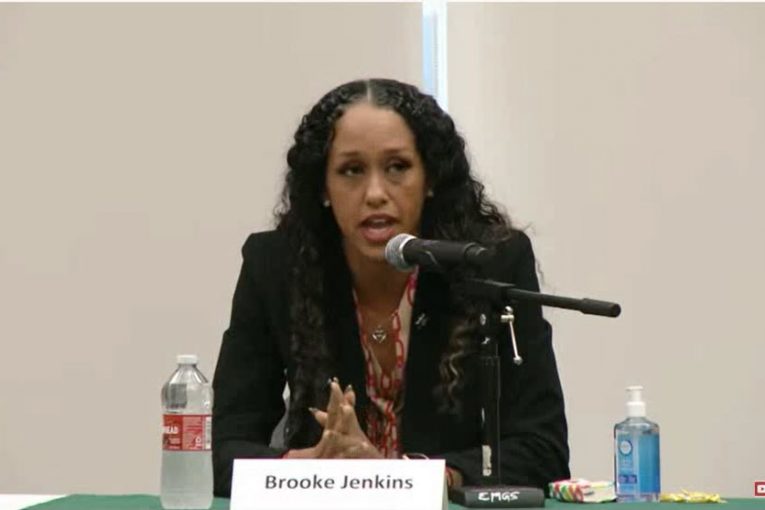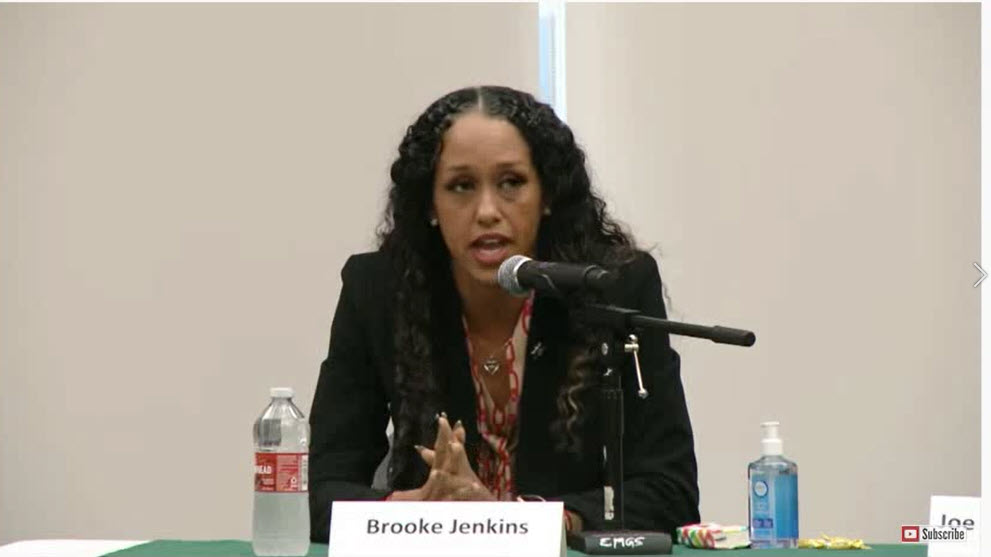

By David M. Greenwald
Executive Editor
San Francisco, CA – For an appointed incumbent, Brooke Jenkins has certainly generated her share of questionable if not outright illegal conduct in an extremely short period of time.
A few days after the SF Chronicle issued what amounted to a no-confidence non-endorsement comes a story broken first by Mission Local that could have ramifications far beyond the election that she still appears likely to win.
The story is simple, Jenkins sent an email to Assistant DA Don du Bain on October 9, 2021. This was after both Jenkins and du Bain had given notice that they were leaving the office on October 16.
The email was, “Troy McAllister Police reports.”
And according to the article, “It contained three police reports regarding the serial offender who, while driving intoxicated on Dec. 31, 2020, struck and killed two pedestrians. All three police reports were unredacted and, significantly, one contained a lengthy, unredacted rap sheet for McAlister, dating back to 1993.”
Basically according to many, disseminating police reports to those who are not actively working on a case is a “breach of conduct.” But  disseminating a criminal history like a rap sheet is actually a criminal offense.
disseminating a criminal history like a rap sheet is actually a criminal offense.
This is just the latest in a long line of legally questionable conduct by Jenkins that has emerged since her appointment this past summer. There is the issue of her compensation when she was supposedly a volunteer on the recall campaign and a bar complaint filed in the last month that outlines her history of dishonesty and prosecutorial misconduct.
For her part, she has shrugged off the complaints.
She told the Chronicle this is a “politically motivated” distraction. She claimed that “she accidentally used du Bain’s personal email address and that she’d launched an investigation into the release of her email.”
She told the media, “These files were never used on the recall campaign, or for any political purposes, and were never disclosed to the public.. What we do know is that my email from when I was an assistant district attorney and these files were inappropriately, and potentially illegally obtained and shared by someone.”
But as the Chronicle noted, “Jenkins didn’t explain why she sent the email to someone who was also days away from leaving.”
The story doesn’t really add up. As former prosecutor Ryan Khojasteh pointed out, “Any current and former city employee knows you can’t “accidentally” send an email from your official work email to someone’s personal email.”
Khojasteh in a tweet stream explained why that was the case.
San Mateo County District Attorney Steve Wagstaffe told Mission Local bluntly, “In our office, this would be a firing offense.”
He added: “It is a misdemeanor offense to share a rap sheet for any purpose other than doing the prosecution.”
Former Los Angeles DA Gil Garcetti concurred. “You should not be sending police reports or rap sheets to anyone who does not have a direct interest in the particular case,” he said. “If you cannot articulate a reason to get a rap sheet, you should not have it.”
The Vanguard spoke to one source who believed “there’s just no argument to excuse this stuff.”
Under a more ideal scenario the Attorney General would prosecute and there would be a Bar complaint.
Another observer noted, “I’ve never seen somebody get so much bad press at the beginning of their tenure.”
That observer added, “I think regardless of where you people may have fallen on the recall I don’t think this is what they were looking for as a replacement. They’re looking for stability, someone that can give them confidence that they have the legal acumen to make charging decisions and settlement decisions. And someone that isn’t gonna use cases and rap sheets as political footballs that they can just throw around and try to gain yards with.”
Santa Clara University School of Law professor W. David Ball told Mission Local that “du Bain’s actions constituted a weaponization of the prosecutor’s office.”
“The model we have of the prosecutorial function is that we are not punishing political enemies,” he said. “We can disagree about what prosecutorial policies should be. But making this a political tool to use the position of the office to attack political enemies? That really is quite dangerous.”
That leads me to wonder how much of this is a matter of Jenkins being over her head, thrust into a position that she was not completely prepared for and how much of this was her trying to manipulate the situation from the start.
One thing I would note is the very first observation of Jenkins, when she was in a corner, in danger of losing the Carter-Bibbs case in 2019, and she resorted to tactics that appeared to cross ethical lines and possible legal lines attempting to coach a young witness.
Now we see an entire pattern of behavior—she ends up leaving the DA’s office after a disagreement with Boudin over her handling of a sensitive case, she forwards emails to du Bain, she quits, gets on TV to blast the DA, joins the recall campaign ostensibly as a volunteer but we learn later she is being compensated (heavily) by the recall committee for her work, and she becomes a spokesperson for the recall and ultimately gets named to the position.
That each of those steps were undertaken through very questionable legal and ethical tactics adds up to mounting evidence of a pattern of conduct that is unseemly for the chief law enforcement officer in a given jurisdiction.
Whether the system has the capacity to actually address this issue—probably not through the election process, but more likely through a legal or professional oversight capacity—remains to be seen.


If Jenkins is elected next week, she should be removed for prosecutorial misconduct. If she isn’t removed, it will represent a searing indictment of the so called criminal justice system.